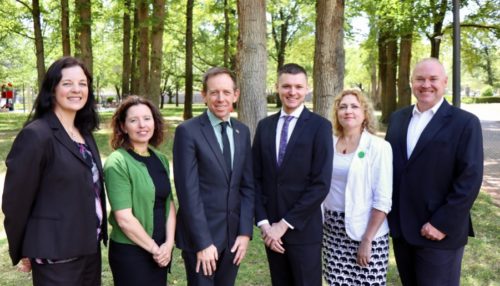
THE Greens are pushing for a motion on the ACT Legislative Assembly floor to vote the banks out of Canberra public schools.
The deadline set down for Wednesday (February 10) calls on Labor to join the Greens to end programs run by the major banks and other financial institutions which alleges that their purpose is not motivated by educating children on saving money.
ACT Greens spokesperson on education, Johnathan Davis, has also accused the schools of having a pecuniary interest that they have not declared to benefit from allowing banks to intervene in public education.
The Greens need to convince seven other members to vote for the motion that would scrap the school programs by the end of June this year.
The ACT coalition government holds 16 of the 25 seats since the election in October 2020 ahead of the first sitting in the assembly this week.
“Banks aren’t a community service,” Mr Davis said.
“They don’t care about education or community well-being; they care about making money. I don’t want to see our kids subjected to the sophisticated marketing machines of the big banks.”
Mr Davis, 29, has also detailed how he experienced not only homelessness but economic hardship as the driving force behind the motion.
It highlights non-commercial resources that are available to teach real-life financial skills, and calls for ACT government schools to deliver more financial literacy.
A recent report from the Australian Securities and Investments Commission found banking classes “do not promote savings behaviour” in children nor improve financial literacy.
“Reading the report, I was extremely disappointed to learn that many schools receive kick-backs from banks for every student they sign up to one of these programs,” Mr Davis said.
“Our schools don’t exist to create customers for big banks.
“The banks will tell us that they provide financial literacy programs that help improve young people’s relationships with money, but they provide no evidence to prove that.”
Deakin University researcher Carly Sawatzki, an expert on school banking programs, encourages a grassroots approach to teaching healthy financial habits.
“With the right professional learning and support, schools and teachers can identify the financial literacy learning needs within their local communities and design savvy programs to meet these needs,” Ms Sawatzki said.
“One size fits all teaching packages tend to not keep up with the dynamically changing financial environment. Nor do they hone in on the sensitive economic and financial issues the pandemic has exposed.”
Sawatzki referenced how buy-now, pay-later schemes are overlooked by schools, but which “may negatively affect the financial health of young people”.
Who can be trusted?
In a world of spin and confusion, there’s never been a more important time to support independent journalism in Canberra.
If you trust our work online and want to enforce the power of independent voices, I invite you to make a small contribution.
Every dollar of support is invested back into our journalism to help keep citynews.com.au strong and free.
Thank you,
Ian Meikle, editor




Leave a Reply